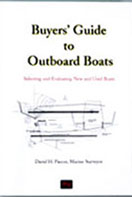Are You a Candidate for a Being Happy Boat Owner?
A lot of people go out and buy a boat on what amounts to a whim, only to discover the hard way that there’s a lot more to it than they anticipated.
Chances are, if you’ve gone to the trouble to buy this book, that does not describe you. My purpose here is to help you try to anticipate whether you’re really up for it.
Here are some of the reasons why people get into trouble with boats: Ownership usually proves more costly than they expected, it involved more work than anticipated, or it turned out that they didn’t have as much time as they thought they’d have to use the boat.
It is very easy to get in over one’s head financially through not taking the time to add up all the costs, and including a cushion for unanticipated expenses.
Many people make the mistake of buying a new boat with the idea that the warranty and insurance are going to eliminate all maintenance and repair costs. Rest assured, these won’t. I explain why further on in this chapter.
Maintaining a boat properly is a lot of work. Always has been, always will be; that’s just the nature of boats, and unless you’re willing to do the work yourself, or can afford to pay someone else (few can), then be prepared to see the resale value of your boat decline very rapidly.
If the best you can do is just to tolerate the effort of taking care of it, if you don’t really enjoy this sort of thing, perhaps you should reconsider.
Remember, as a boat owner, everybody loves you when you take them out for a day of fun, but the usual scenario is that when the fun is over and it’s time to do the clean up, repairs and maintenance, those folks tend to disappear or have something better to do.
When it comes time to paint the bottom, compound and wax the boat, clean the bilges, change the oil or lay it up for winter and whatnot, chances are you’ll be doing it all alone.
Those members of the family who so enthusiastically cheered your decision to buy a boat are nowhere to be found when work time rolls around.
It’s like the perennial story of the child who wants a puppy. He begs, pleads and swears that he’ll take care of it.
A week later it’s the parents who are cleaning up the endless little “accidents” and feeding it. Ah, the wonderful world of good intentions.
The amount of pleasure that you derive from a boat will be a function of whether you enjoy doing some maintenance, and how often you get to use it.
If you get to use it seldom, chances are it will become a burden.
Why Are Boats So Damned Expensive?
Boats are expensive for two reasons, and one of them is not because people who buy boats have a lot of money, and that marine manufacturers therefore try to gouge them. No, that won’t work in a free market economy.
The first reason is that boats exist in a very hostile environment.
Salt water is extremely corrosive, and that requires the use of expensive, high quality materials to withstand this environment. Fresh water is a little better, but not much.
The same engines that are used in road vehicles have to be “marinized,” meaning adapted to the marine environment.
Similar parts in cars that can be made of inexpensive iron and steel, in boats they have to be made of costly brass, bronze and stainless steel.
Even electrical wire for boats is higher quality and more costly. Even the interiors of boats have to use higher quality materials than are normally found in high quality homes or automobiles because sooner or later parts of the interior get wet.
The second reason is “low production numbers.”
Undoubtedly you’ve heard the term “economy of scale.” Well, when it comes to boats and marine equipment, there is very little in the way of economy of scale.
Boaters do not benefit from products made by the millions or even hundreds of thousands, as with most other consumer products.
Quantities of parts made and sold are usually no more than tens of thousands, as compared with millions for other consumer products.
The numbers of boats built by any one builder are even less. And when we break it down by different models per builder, the numbers are fewer still.
To give you an general idea, production runs typically number from 200 to several thousand, depending on boat size and price.
Boats are basically hand made items, which involve enormous amounts of labor, and so they are not cranked out of production lines like cars with cookie-cutter sameness.
Both boats and houses are similar in that they are not amenable to being produced by machines.
Some Interesting Numbers
Consider the cost of basic materials. Fiberglass laminate costs roughly $7/lb. That doesn’t include cost of labor, overhead or tooling.
A typical twenty four foot outboard center console boat has an average laminate thickness (we include frames and stringers, etc. to arrive at this thickness) of approximately 1/2” .
The square footage of a hull is approximately 250 square feet, and since one square foot of 1/2” of fiberglass weighs roughly 4 lbs, a typical 24’ solid glass boat hull weighs roughly 1,000 lbs.
At a base materials cost of $7/lb., our fiberglass hull costs approximately $7,000 excluding labor and we haven’t even added the deck yet.
A board foot of mahogany, which is also one square foot, now costs upwards of $15/sq.ft. so if we still made boats out of wood, our boat would use up about $6,000 worth of mahogany and many more weeks of labor.
Our glass boat hull takes two men two days. Plus, there is a lot of wastage when using wood and almost none with fiberglass.
While the wooden boat is theoretically cheaper, the labor costs will more than make up the difference over materials with fiberglass.
Thus, fiberglass ends up as a cheaper material that lasts longer. So while fiberglass boats may seem to be outrageously expensive, they’re really a pretty good deal when you consider how long they last.
HOME > Buyers' Guide to Outboard Boats >


